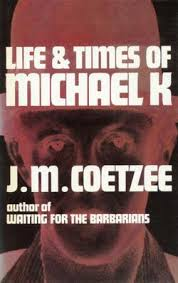J.M. Coetzee’s Life & Times of Michael K (1983) is a profound and thought-provoking novel that explores themes of identity, survival, and the human spirit amidst the backdrop of apartheid-era South Africa. Coetzee, a South African writer and Nobel Laureate, is known for his sharp, minimalist prose and his ability to confront difficult themes in his work. Life & Times of Michael K is one of his most notable works and was awarded the Booker Prize in 1983.
Plot Overview:
The novel follows the life of Michael K, a simple, introverted man born with a cleft palate in apartheid South Africa. Michael is marginalized from society both because of his physical disability and his status as a lower-class, black man. The novel begins when he decides to leave the city of Cape Town and travel to his mother’s rural home in the countryside, after she falls ill. However, his journey is interrupted by the ravages of the civil war between the South African government and anti-apartheid forces, which causes widespread chaos and instability.
As Michael attempts to care for his mother and navigate through the war-torn landscape, he encounters a series of increasingly surreal and harrowing experiences. His journey becomes not only a physical quest for survival but also a deeper exploration of his own sense of self. The novel is structured around Michael’s internal struggles and his interactions with the harsh, oppressive world around him.
Key Themes:
-
Isolation and Alienation: Michael’s character is defined by his isolation from the world, both physically and emotionally. He is a figure who is marginalized by society due to his disability, his poverty, and his lack of social mobility. Coetzee explores how these factors shape Michael’s sense of self and his relationships with others. The novel asks larger questions about how people who are "outside" of mainstream society are treated, and how they navigate a world that often excludes them.
-
Survival and the Human Spirit: Throughout the novel, Michael is confronted with extreme hardship, yet he displays a quiet resilience. His journey becomes a struggle for survival, not only physically but also emotionally and psychologically. The novel explores what it means to survive in a society that is indifferent or even hostile to one’s existence. Michael’s actions reflect a deeper, almost existential struggle for meaning and humanity in a dehumanizing world.
-
Identity and Self-Determination: The novel raises questions about the construction of identity in a politically and socially repressive environment. Michael’s lack of conventional ambition or desire to conform to societal norms sets him apart from others. He is not driven by material success or societal expectations, which makes his story both unique and unsettling. In his quiet refusal to conform, Michael challenges the societal standards imposed on individuals.
-
The Impact of Apartheid: While the novel does not explicitly focus on the political details of apartheid, it is set against the backdrop of a divided, war-torn South Africa. Coetzee uses Michael’s experiences to highlight the larger systemic forces at play—racial discrimination, class disparity, and the ongoing violence that affects everyday life. The violence and upheaval that Michael encounters are deeply tied to the broader political conflict, but they are also experienced on a personal, human scale.
-
Compassion and Humanity: Despite the harshness of his world, Michael displays moments of profound compassion, especially in his attempts to care for his mother. His quest to take her to the countryside is, in part, a search for a sense of dignity and home in a world that seems to have lost both. The novel suggests that despite the brutality of apartheid and the alienation it breeds, there are still moments of connection and tenderness.
Narrative Style:
Coetzee’s writing is sparse and precise, reflecting the emotional restraint of his protagonist. The novel’s focus is on Michael’s internal journey, and much of the narrative unfolds through his thoughts and reflections. Coetzee avoids sentimentality and instead uses his minimalist style to convey a sense of the harshness and austerity of the world in which Michael lives.
The novel is also filled with moments of surrealism and ambiguity. Michael’s experiences sometimes blur the line between the real and the imagined, as he struggles to maintain his humanity in the face of overwhelming adversity. This gives the novel an allegorical quality, allowing it to be read on multiple levels—both as a personal journey and a commentary on the broader social and political realities of apartheid South Africa.
Symbolism:
Michael’s journey is not just a literal one, but also symbolic. His movement between urban and rural spaces, his struggle with his identity, and his quiet resistance to the structures around him all serve as metaphors for the larger struggle of marginalized individuals in an oppressive society. His search for a place where he can be himself mirrors the search for a free, just, and humane South Africa.
Life & Times of Michael K is a profound meditation on the human condition, set within the context of apartheid. Coetzee’s novel challenges readers to think deeply about identity, survival, and the nature of humanity in a world where political and social systems often seem indifferent or actively hostile to individual lives.
Would you like to dive deeper into any specific aspect of the novel, such as its symbolism, characterization, or Coetzee’s writing style?












.jpg)
